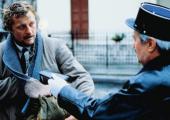Albert Serra has earned himself the directorial moniker “the Catalan king of stasis”, and nothing in The Death of Louis XIV is going to dispel such a reputation – if anything, he has honed that characteristic approach further, concentrating this story of the declining days of the Sun King into a single royal bedchamber. However, there is one new element: it’s the first time the director has worked with professional actors, which at least ensures that his film's studiedly visual longeurs are handled with first-class Gallic thespian assurance.
Never more so than from French New Wave legend Jean-Pierre Léaud in the title role: he plays the 76-year-old fading monarch with an assurance no less absolute than the rule that the longest-serving king of France had exerted in life. Much has been made of the difference between Leaud’s very first screen role – in particular, that closing freeze frame of Truffaut's The 400 Blows – and the practically immobile intensity that he conveys here, and the contrast could hardly be more acute. It’s a bravura performance, which somehow compels attention over 115 occasionally agonising minutes, catching a sense of character in minute movements of the face or variations in exhalations of breath.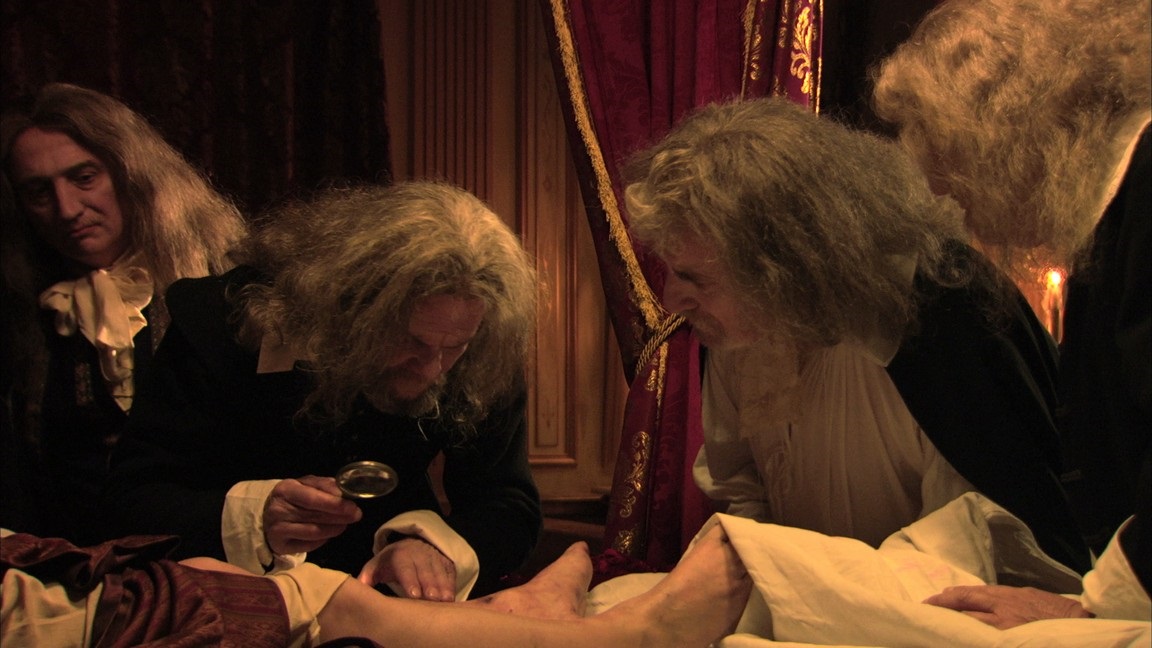 Louis has a pain in his leg; as it worsens, he is confined to bed; eventualy gangrene sets in. The process of dying is slow and laboured, and the principle action – hardly the right way of putting it – comes from the deliberations of the doctors who discuss and administer a variety of treatments (pictured above). However, Serra does achieve one scene in which the awareness of approaching death becomes transfixingly clear, as Léaud stares into the camera, unforgettably locking the audience’s gaze. It's a stark moment of contrast in mood, the breach of the fourth wall emphasised by the accompaniment of Mozart’s Great C minor Mass (there is no other incidental music in the film).
Louis has a pain in his leg; as it worsens, he is confined to bed; eventualy gangrene sets in. The process of dying is slow and laboured, and the principle action – hardly the right way of putting it – comes from the deliberations of the doctors who discuss and administer a variety of treatments (pictured above). However, Serra does achieve one scene in which the awareness of approaching death becomes transfixingly clear, as Léaud stares into the camera, unforgettably locking the audience’s gaze. It's a stark moment of contrast in mood, the breach of the fourth wall emphasised by the accompaniment of Mozart’s Great C minor Mass (there is no other incidental music in the film).
The silence and stasis is broken, to varying degrees, by Serra’s depiction of the court, or at least that element of it that appears in the anteroom of the monarch’s bedchamber. Comedy is probably not the right word (and satire not much more appropriate) but the stylised sycophantic attentions are memorable. His Royal Highness is applauded – Bravo, sire! – for every small gesture he manages, a flourish of the hat, or managing to eat a single biscotto. There are early innuendos that hint at past sexual liaisons, but by this stage his affection for his dogs seems more powerful than anything else. Part of the time his secret wife Madame de Maintenon sits inscrutably to one side, while another episode (main picture) brings a visit from his five-year-old successor, the future Louis XV. Don’t imitate me in architecture, or war, is the gist of his advice.
No wonder Molière gets a mention, with quacks like these around
Louis has a right royal caprice, calling urgently for water in the night, then refusing to drink it except from a crystal goblet. “Let me know when you’ve decided to cure me,” he harrumphs to his physicians. The doctoring is grimly comic, led by Fagon (Patrick D’Assumcao) who variously prescribes remedies like donkey’s milk, and tries to resist bringing in outsiders to consult – first from the Sorbonne, then finally a strangely accented charlatan from Marseilles whose elixir includes bull sperm and frog fat. No wonder Molière gets a mention, with quacks like these around. “We haven’t tried the jelly yet” is just one line that Serra and his co-writer Thierry Lounas might have borrowed from Carry On. Though the film’s title appears to preclude any need for spoiler alerts, there’s a touch of unexpected grotesque to its conclusion. (Hint, sausages.)
Such details are apparently based on medical testament, while the story itself draws on court remembrances, principally the Memoirs of the Duc de Saint-Simon. After a brief opening scene with Louis in his Versailles gardens, it’s all interiors, which are a triumph for cinematographer Jonathan Ricquebourg, working exclusively with candlelight to produce a deeply painterly effect – sumptuously rich reds recall the Old Masters – and Sebastian Vogler’s production design. No praise is high enough (literally) for the film's perruquiers.
Overleaf: watch the trailer for The Death of Louis XIV


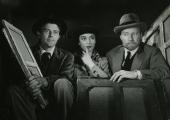

 Louis has a pain in his leg; as it worsens, he is confined to bed; eventualy gangrene sets in. The process of dying is slow and laboured, and the principle action – hardly the right way of putting it – comes from the deliberations of the doctors who discuss and administer a variety of treatments (pictured above). However, Serra does achieve one scene in which the awareness of approaching death becomes transfixingly clear, as Léaud stares into the camera, unforgettably locking the audience’s gaze. It's a stark moment of contrast in mood, the breach of the fourth wall emphasised by the accompaniment of Mozart’s Great C minor Mass (there is no other incidental music in the film).
Louis has a pain in his leg; as it worsens, he is confined to bed; eventualy gangrene sets in. The process of dying is slow and laboured, and the principle action – hardly the right way of putting it – comes from the deliberations of the doctors who discuss and administer a variety of treatments (pictured above). However, Serra does achieve one scene in which the awareness of approaching death becomes transfixingly clear, as Léaud stares into the camera, unforgettably locking the audience’s gaze. It's a stark moment of contrast in mood, the breach of the fourth wall emphasised by the accompaniment of Mozart’s Great C minor Mass (there is no other incidental music in the film).


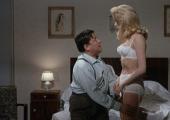
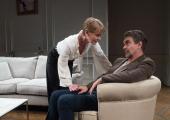

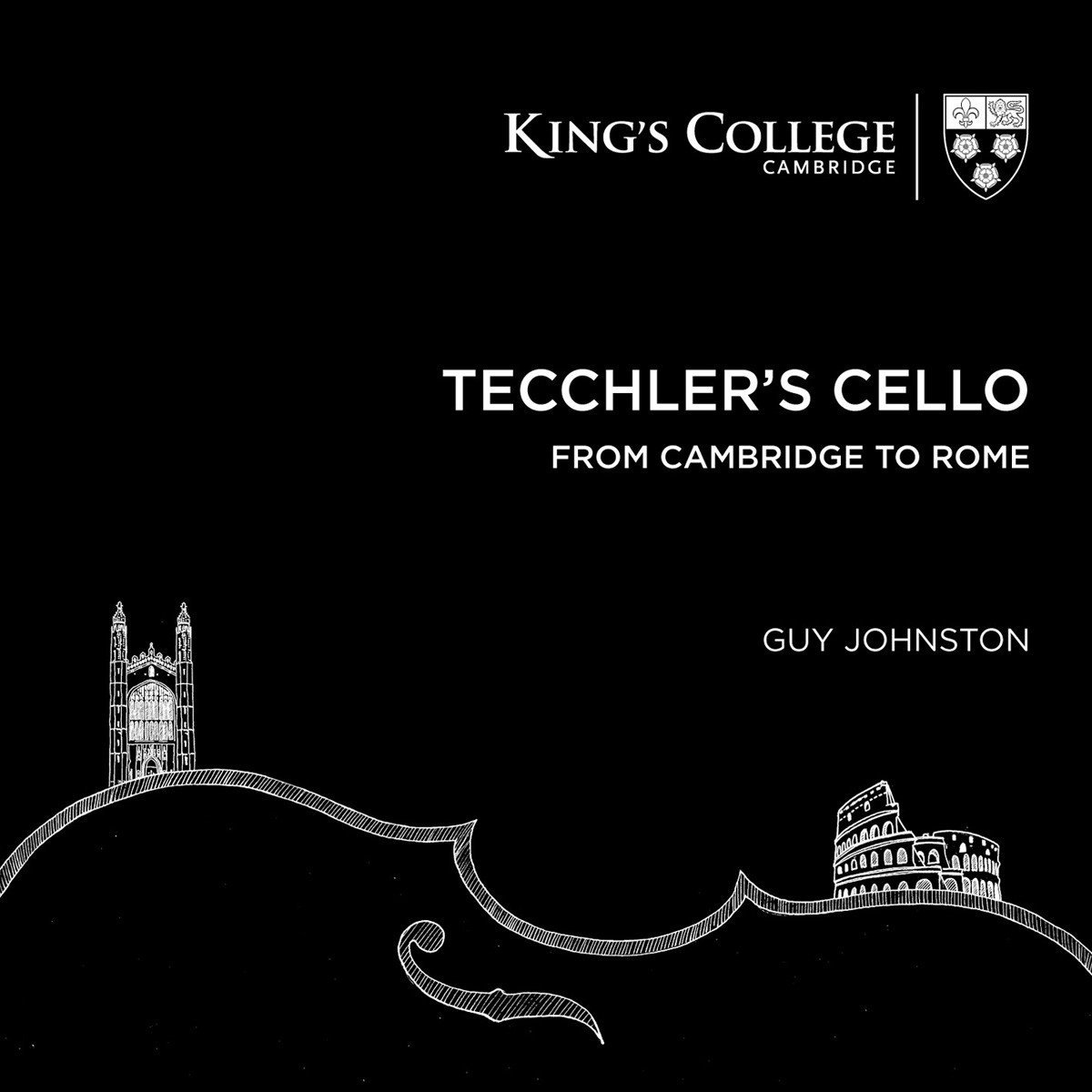 Guy Johnston: Tecchler’s Cello - From Cambridge to Rome (King’s College Cambridge)
Guy Johnston: Tecchler’s Cello - From Cambridge to Rome (King’s College Cambridge)